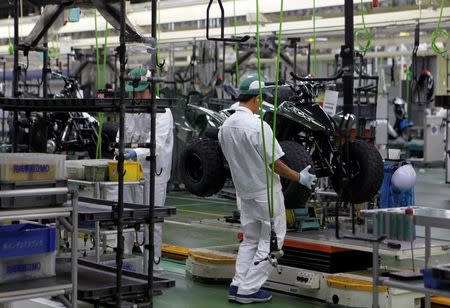Japan output jump, low jobless rate yet to spark inflation
By Leika Kihara and Stanley White TOKYO (Reuters) - Japanese factory output rose at the fastest pace in eight months and the jobless rate hit a two-decade low in February, a sign a rebound in overseas demand continued to brighten prospects for the country's export-reliant economy. But household spending remained soft and consumer inflation was flat when stripping away the effect of rising energy costs, underscoring the challenges the Bank of Japan faces in generating sustained price rises backed by steady wage growth. The data may reinforce market expectations that while the BOJ's next policy move could be to withdraw its massive stimulus, the timing would be some time away, analysts said. "We can tell that Japan's economy is benefiting from a cyclical pickup in the global economy," said Masamichi Adachi, senior Japan economist at JPMorgan Securities. "But corporates are reluctant to raise prices because consumption is weak ... The simple answer for the government and the BOJ is to wait and see." Industrial output rose 2.0 percent in February from the previous month, beating market forecasts for a 1.2 percent gain to mark the biggest increase since June last year, as automakers ramped up production of new models, data showed on Friday. Separate figures showed Japan's jobless rate hit a 22-year low of 2.8 percent in February, down 0.2 percentage point from the previous month. But household spending fell 3.8 percent in February from a year earlier, a bigger decline than market forecasts for a 1.7 percent drop, suggesting a tightening labour market has yet to drive up wages enough to boost consumption. ECONOMY GOOD, PRICES WEAK A rebound in energy costs pushed core consumer inflation to 0.2 percent in February, matching a median market forecast and marking the fastest annual pace in nearly two years. But a separate consumer price index that excludes the effect of volatile fresh food and energy costs rose just 0.1 percent in February, suggesting that weak consumption was preventing companies from raising prices of non-energy items. Tokyo core consumer prices, which are less influenced by gasoline costs and released a month ahead of nationwide figures, fell 0.4 percent in March from a year earlier. That was bigger than a 0.3 percent drop in February. "While we still think price growth will continue to pick up, it's true the underlying trend isn't that strong," said Yoshiki Shinke, chief economist at Dai-ichi Life Research Institute. "Depending on oil and yen moves, it may take longer than expected for inflation to approach 1 percent," he said. Japan's long-stagnant economy has shown signs of life in recent months, with exports and factory output benefiting from a recovery in global demand. Analysts expect consumer inflation to accelerate near 1 percent later this year as the base effect of last year's oil price falls dissipates. That has led to a dramatic shift in market expectations, with a majority of analysts polled by Reuters predicting the BOJ's next move would be to start scaling back its stimulus. With inflation far from his 2 percent target, however, BOJ Governor Haruhiko Kuroda has stressed that he sees "no reason" to dial back the bank's massive stimulus programme anytime soon. BOJ officials have stressed that they would look at various data, not just the core consumer price figures, in determining whether underlying trend inflation is accelerating backed by solid economic growth. They argue that wage rises must accompany price gains for inflation to sustainably hit 2 percent. (Reporting by Leika Kihara; Editing by Eric Meijer)

 Yahoo Finance
Yahoo Finance 

